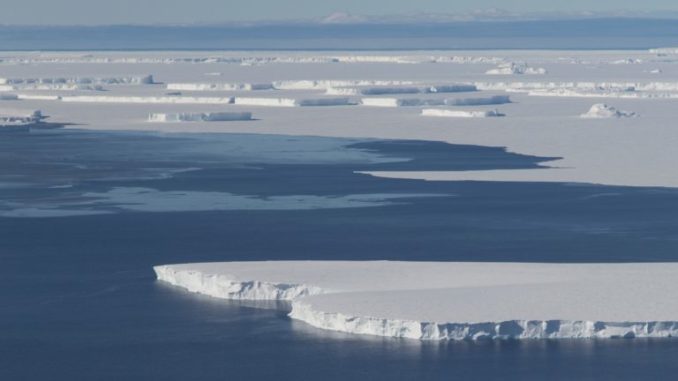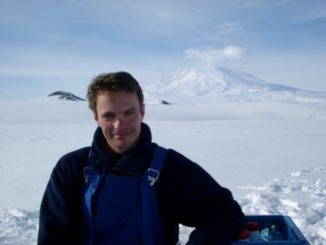
April 30, 2018, by Alex Kirby
British and American scientists are joining forces to research the melting of an Antarctic glacier in what they are calling a race against time.
CAMBRIDGE, UK, 30 April, 2018 – An international team of scientists is mounting an ambitious research programme to find how soon a vast Antarctic glacier may collapse, with implications for sea levels worldwide.
The Thwaites Glacier in West Antarctica could significantly affect global sea levels. It already drains an area roughly the size of Britain or the US state of Florida, accounting for around 4% of global sea-level rise, an amount that has doubled since the mid-1990s. Its collapse would destabilise other parts of the ice sheet.
If – or more likely when – Thwaites and its neighbour, the Pine Island glacier, ultimately lose all their ice, one estimate suggests that could raise global sea levels by about 3.4m, enough to affect every coastal city on Earth.
Fastest-moving
Satellites have shown for more than a decade that the Thwaites region is an area of massive change and rapid ice loss as the global climate warms in response to rising greenhouse gas emissions from humans’ profligate use of fossil fuels. The two glaciers are among the fastest-moving in the Antarctic.
One of the scientists involved in the research is David Vaughan, director of science at the Cambridge-based British Antarctic Survey (BAS). He says he and his colleagues are involved in “a race against time”.
Professor Vaughan told the Climate News Network: “Understanding sea level rise is the front line of climate change, and sea level rise doesn’t happen overnight. [What’s happening to Thwaites] is not an emergency this year, but I’m very glad we’re doing the research this decade, because we can’t wait too long.”
Understanding collapse
As part of a new £20 million (roughly US$27.5m) research collaboration, the UK Natural Environment Research Council and the US National Science Foundation are about to send a team of scientists to Antarctica to gather the data needed to understand when the collapse of the Thwaites glacier could begin – in centuries, or in the next few decades.
NERC and NSF are jointly funding eight large-scale projects that will bring together leading polar scientists in the International Thwaites Glacier Collaboration (ITGC), the largest joint project undertaken by the two nations in Antarctica for more than 70 years. The ITGC involves around 100 scientists from leading research institutes in both countries with researchers from South Korea, Germany, Sweden, New Zealand and Finland.
There are signs that the process of Thwaites’ collapse has already begun. Antarctica’s glaciers add to sea-level rise when they lose more ice to the ocean than they gain from snowfall. To fully understand the causes of changes in ice flow requires research on the ice itself, the nearby ocean, and the Antarctic climate.
“Sea level rise doesn’t happen overnight. [It’s] not an emergency this year, but I’m very glad we’re doing the research this decade, because we can’t wait too long”
The Collaboration will use drills that can make access holes 1,500 metres into the ice with jets of hot water, as well as other state-of-the-art techniques and equipment, such as autonomous submarines like the Autosub Long Range, the first of whose fleet is named Boaty McBoatface.
While NERC is funding the UK’s share of the project, it is being co-ordinated by BAS, whose total annual budget is around £50m. The agency co-ordinating the US share is the National Snow & Ice Data Center.
As well as the cost of the research itself, the physical problems of mounting a scientific campaign in one of the most remote places in Antarctica could cost as much again in logistical support. The nearest permanently occupied research station to the Thwaites glacier is more than 1,600km away, so even getting the scientists to where they need to be will be demanding.
Collaboration welcome
Researchers on the ice will rely on aircraft support from UK and US research stations, but oceanographers and geophysicists will approach the glacier from the sea in British and American research icebreakers.
The UK’s science minister, Sam Gyimah, said: “Rising sea levels are a globally important issue which cannot be tackled by one country alone. The Thwaites glacier already contributes to rising sea levels, and understanding its likely collapse in the coming century is vitally important.”
The five-year programme begins in October this year and continues to 2023. Its data will be archived and freely shared when it ends. – Climate News Network
Source: https://climatenewsnetwork.net/uk-and-us-scientists-tackle-antarctic-glacier/
Visits: 33


Be the first to comment